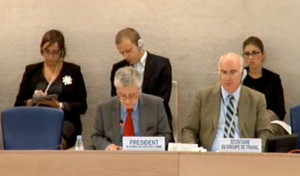- 12 nations urged China to make human rights improvements in Tibet
- China has until March to accept or reject the several recommendations on Tibet in the UPR Working Group report
- Governments are urged to press China to accept, not ignore, Tibet recommendations

Mr. Remigiusz Achilles Henczel, President of UN Human Rights Council at the adoption of the Working Group Report on China’s UPR 25 October 2013, Geneva.
Tibet concerns raised
Twelve states raised concerns on Tibet to the Chinese delegates at the Human Rights Council (HRC) –in both oral statements and advance written questions.[1] The delegates cited the lack of religious freedom, minority rights, and access of UN officials to Tibet, and called on China to resume dialogue with the Dalai Lama. (The October 22 session’s webcast is available here.)
In addition, a number of states[2] expressed concern about the rights of ethnic minorities, freedom of religion and belief, as well as discriminatory practices – all of which are pertinent to the human rights situation in Tibet. Some states urged China to promptly take all necessary steps to facilitate visits by the UN High Commissioner for Human Rights and other UN special procedure mandate holders.
On October 25, 2013, the HRC’s UPR Working Group adopted its report on the People’s Republic of China (PRC), prepared by the troika composed of Poland, Sierra Leone and the United Arab Emirates.
China’s response
As a routine part of the process, the Chinese delegation, led by the Special Envoy of the Ministry of Foreign Affairs Wu Hailong, responded to the statements by member states. Responding to the Tibet specific questions raised by other governments Mr. Liu Peng Director, Seventh Department United Front Work Department of CPC Central Committee stated that remarkable progress had been made in the field of human rights in Tibet, citing statistics on the increase of GDP and life expectancy, and decrease of illiteracy rate.
He said that the self-immolations in Tibet had been instigated by the “Dalai Lama clique.” The Chinese also said that the fundamental reason for the lack of progress on talks with the Dalai Lama was because of his demand for the “independence of Tibet.”[3]
Addressing the lack of access to Tibet by foreign delegations, the Chinese delegates explained that it had been impossible to accommodate all requests for visits due to the harsh geographic and climatic conditions on the Tibetan plateau.[4]
Moreover, China had to respond to questions concerning its overall human rights issues such their failure to ratify the International Covenant on Civil and Political Rights, anti-discrimination laws, a moratorium on executions and greater transparency around its capital punishment system, harassment of human rights defenders and civil society organizations, as well as judicial transparency and arbitrary detentions.
Countries considered to be allies of the Chinese government praised China for its allegedly improved human rights record. Cuba and Venezuela highlighted efforts in the fields of the right to self-determination and minority rights protection. Some states urged China to continue the ‘stability maintenance approach’ against Tibetans, such as Pakistan, which recommended to “strengthen action against criminals who intimidate or help those who commit self-immolations”, and Sri Lanka, which recommended to “continue counter terrorism and ethnic separatism.”
Next steps
By the 25th HRC session in March 2014, China must tell the Council which of the 252 UPR recommendations it will accept and which it will not. In the October session, China said that the vast majority of the recommendations in the report were “well intentioned and constructive” and that China would “carefully consider them in light of China’s national conditions and give feedback before the Human Rights Commission next March.”[5]
In March, the Council will discuss the Working Group Report and China’s acceptance or non acceptance of the recommendations. In a one hour session before the Council votes to adopt the outcome, 20 minutes will be allotted to China to speak, 20 to other governments, and 20 minutes to non-governmental organizations.
In its first UPR in 2009, China only accepted recommendations that addressed the economic development of Tibetans, and did not accept recommendations dealing with the civil and political rights of Tibetans specifically.[6]
Recommendation to governments
As consistent with the original intent of the UPR process, China’s UPR provides an opportunity for China to commit to resolve many of the fundamental problems in Tibet and work to address the grievances of the Tibetan people as identified in the many statements made at the Council and recommendations in the Working Group report.
Therefore, the International Campaign for Tibet calls upon States to urge the Chinese government to accept the recommendations on human rights improvements in Tibet.
Footnotes
[1] Canada, Czech Republic, France, Germany, Iceland, Japan, New Zealand, Poland, Switzerland, the United Kingdom and the United States made oral statements and in addition the US, UK, Canada and Sweden forwarded advanced written questions on Tibet.
[2] For example, Austria recommended China to improve its legislation “to allow ethnic minorities to preserve their cultural identity (…) and ensure their participation in decision-making in accordance with the Chinese Constitution”; Australia recommended that China “permanently lift restrictions on access to minority areas” and Italy asked for a review of China’s legislation on “administrative restrictions in order to provide better freedom of religion.”
[3] See webcast of China’s statement at: http://webtv.un.org/meetings-events/human-rights-council/watch/china-review-17th-session-of-universal-periodic-review/2760262775001 (1:43:10 onward)
[4] Ibid
[5] Remarks by Mr. Wu Haitao, Ambassador and Charge d’Affaires of the Permanent Mission of China to the UNOG at the adoption of the report. The remarks can be accessed on webtv.un.org/meetings-events/human-rights-council/watch/china-upr-adoption-17th-session-of-universal-periodic-review/2767653191001
[6] http://daccess-dds-ny.un.org/doc/UNDOC/GEN/G09/162/99/PDF/G0916299.pdf?OpenElement Conclusions and Recommendations Paragraph 114

